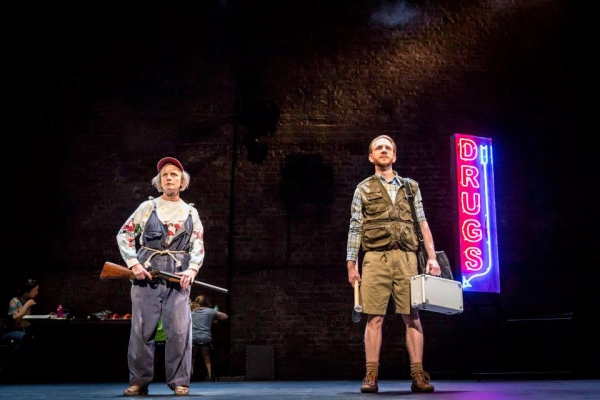Adler & Gibb (Royal Court)
Tim Crouch’s latest play is a slow burning exploration of art and appropriation

© Johan Persson
The couple of the title are Janet Adler and Margaret Gibb, a pair of fabricated conceptual artists who we are told first met in the 1970s and remained together until Adler's death. In the present, an obsessive actress (Denise Gough) prepares to play Adler in a new film, breaking into the isolated, run-down home of the two artists with her acting coach (Brian Ferguson) for the sake of her "method". But what they didn't bargain for was running into an ageing Gibb (Amelda Brown). In 2004, meanwhile – and framing the rest of the action – a student (Rachel Redford) is presenting a lecture on Adler and Gibb's work to a scholarship panel. These narrative strands interlace throughout, the past furtively creeping into the present.
“It’s ambitious, both theatrically and intellectually”
“It’s ambitious, both theatrically and intellectually”
There is also another kind of creeping: that of naturalism. The production begins with everything stripped back; we can see the lights, the stage manager, the exposed back wall of the Royal Court stage. When Gough and Ferguson first step on stage as actress Louise and her coach Sam, they direct their lines blankly out at the audience, using their own accents and making only minimal gestures towards representation. Two young children, meanwhile, disrupt the usual meaning making mechanisms of the stage, standing in for dogs and dead bodies. But as the piece goes on, it moves from the real (we're not going to pretend for you) to the realistic (OK, now we're acting) and finally to the almost hyperreal.
There's a real jump in scale from Crouch's previous work, as he and his team of regular collaborators – including co-directors Karl James and Andy Smith – attempt to fill the downstairs stage at the Royal Court at the same time as tackling the twin behemoths of contemporary art and Hollywood movie-making, not to mention the implicit needling at theatrical form. It's ambitious, both theatrically and intellectually, but what these theatre-makers are adept at doing is leaving room for concepts to circulate. The ambling setup of the first half might leave some fidgeting in their seats, but the slow delivery and long silences give priority to the play’s groaning raft of ideas.
Those ideas are swirling and slippery, taking up fluid residence in the mind. Adler & Gibb picks at notions of artistic value, of the relationship between art and meaning, of the relationship between art and life. The film at the heart of the narrative asks questions of both the extreme lengths that actors will go to in the pursuit of "truth" and the brutal acts of appropriation that such film-making involves. And as for theatre, which has always been under the microscope in Crouch's work, Adler & Gibb is fascinatingly ambivalent. Efforts towards realistic representation are unmasked as ridiculous, but still we yearn for and then revel in the detailed naturalistic performances of the second half. Perhaps we just like to pretend.
Adler & Gibb runs at the Royal Court Jerwood Theatre Downstairs until 5 July












